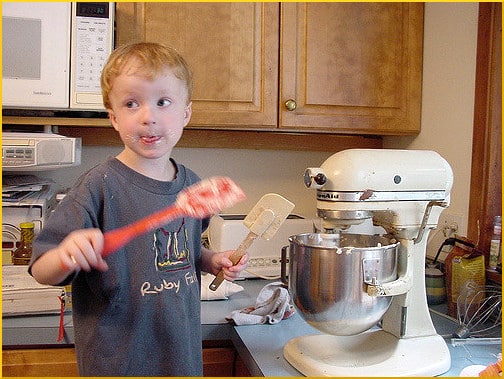
We are still celebrating an extended version of Childhood Obesity Awareness Month, by mentioning a large number of helpful ideas for parents that have been recommended by experts. The whole vast area of food is a major advice magnet, so we found plenty of hints about choosing foods and conducting meals, but wait… Didn’t we skip a step? Like, for instance, the preparation?
Even little kids can measure and mix ingredients. Some families have more advantages than others — for instance, a nearby institution might offer a family-oriented cooking class, and it might even be possible to walk to and from this class, logging some exercise into the bargain.
Here is an enthusiastic endorsement from Joyce Laabs of the Minocqua, Wisconsin, Lakeland Times, of a cookbook for healthier kids published by Randi Lee Levin. Love More, Feed Less is described as an “action” book, with plenty of recipes and advice so specific that “even someone new at cooking can follow her instructions.” Laabs says:
Levin is an advocate of the homemade and offers many great, easy-to-make recipes and helpful hints… She goes to the spice rack and tells you which spices to use with which food to make them tasty. She does the same with commercial sauces and condiments.
Ms. Levin offers one hint that may cause mixed emotions, and has drawn mixed reactions from other experts, which is to control the amount of food on a plate — “especially the amount on the male members of the family.”
The eminent Dr. David Katz wrote about a Swiss study showing that children who helped a parent prepare a healthful meal of chicken, pasta, salad, and cauliflower, actually ate 76% more salad and 24% more chicken than the kids offered the same meal prepared only by a parent.
And if at all possible, parents are urged to grow produce at home because…
A study involving 1,658 parents and their preschool-age children in Missouri found that preschoolers in households with more homegrown produce tended to have a greater preference for fruits and vegetables than their peers who didn’t have an abundance of homegrown produce.
Various other studies have also found that children are less picky and more adventurous about tasting foods they have a proprietary interest in, due to having helped with the growing and/or cooking of them.
A while back, an academic article by the University of Vermont’s Community Development and Applied Economics Chair Jane Kolodinsky, and research associate Amanda Goldstein, made a very controversial claim. Journalist Daniel John Kirk explains this mind-blowing discovery:
Simply put, they found that athletic activity, one’s share of food eaten at home, job, social life — things that one might think would have an effect on BMI within overweight groups — have little to no effect; however, time spent preparing food was shown to be a significant predictor of BMI.
“Time spent preparing food was shown to be a significant predictor of BMI.” Is that wild, or what? Goldstein emphasized to the reporter the importance of taking time to prepare healthful meals, especially because devoting some time to the project usually means that people are using more fresh foods. She says,
Learning those behaviors at a young age and/or passing that knowledge (healthy eating and cooking) along generational lines is necessary to curb the obesity epidemic, especially childhood obesity.
Your responses and feedback are welcome!
Source: “A good idea – ‘Love More-Feed Less’,” lakelandtimes.com, 12/03/10
Source: “How Parents Can Control Childhood Obesity,” verywellhealth.com, 12/04/17
Source: “Kolodinsky and Goldstein Publish Big Finding on Obesity,” uvm.edu, 07/19/11
Photo credit: Tim Pierce on Visualhunt/CC BY

 FAQs and Media Requests:
FAQs and Media Requests: 












One Response
Interesting stuff to read. Keep it up!!
(http://www.seyyone.com/)